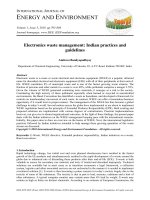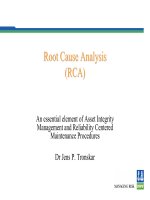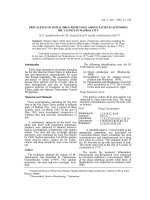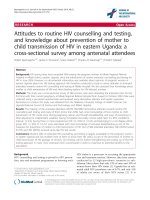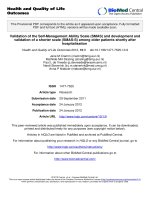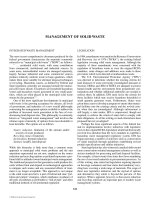Knowledge and awareness of biomedical waste management among final year MBBS students in a medical college and teaching hospital in Hyderabad, Telangana
Bạn đang xem bản rút gọn của tài liệu. Xem và tải ngay bản đầy đủ của tài liệu tại đây (1 MB, 17 trang )
Int.J.Curr.Microbiol.App.Sci (2020) 9(5): 2830-2846
International Journal of Current Microbiology and Applied Sciences
ISSN: 2319-7706 Volume 9 Number 5 (2020)
Journal homepage:
Original Research Article
/>
Knowledge and Awareness of Biomedical Waste Management among
Final Year MBBS Students in a Medical College and Teaching
Hospital in Hyderabad, Telangana
R. Shyamala1, N. Shreya3 and P. Palavardhan2*
1
Department of Microbiology, 2Department of Community Medicine, 3Malla Reddy Medical
College for Women, Hyderabad, Telangana, India
*Corresponding author
ABSTRACT
Keywords
Bio medical waste,
Infectious medical
waste, Waste
management, Waste
disposal
Article Info
Accepted:
23 April 2020
Available Online:
10 May 2020
Biomedical Waste means any waste which is generated during the diagnosis, treatment or
immunization of human beings or animals or in research activities pertaining thereto or in
the production or testing of biologicals. Teaching institutes play a critical role in health
care setup, as it is here that the future health care professionals are trained. The aims and
objectives of this study are a) To evaluate the knowledge of final year MBBS students
about biomedical waste management b)To evaluate the level of awareness of final year
MBBS students towards biomedical waste management. Institutional Ethical Committee
Clearance was obtained from Institutional Ethics Committee. This study was done in
Malla Reddy Medical College for Women (MRMCW) Hyderabad, Telangana State. The
questionnaire was distributed to 100 final year MBBS students of MRMCW in Hyderabad
Telangana state and they were given 30 minutes for completing the questionnaire and then
later the questionnaire was collected from the students. A cross sectional questionnaire
was designed, the questionnaire consisted of 20 questions regarding the knowledge and
awareness of students
towards Biomedical Waste Management. The results were
analysed and we had conducted one workshop to bridge their gaps. We are planning few
more workshops in future about biomedical waste management.
Introduction
Biomedical Waste means any waste which is
generated during the diagnosis, treatment or
immunization of human beings or animals or
in research activities pertaining thereto or in
the production or testing of biological (1).
The waste produced in the course of the
health care activities carries a higher potential
for infection and injury than any other type of
waste (1). Inadequate and inappropriate
handling of health care waste may have
serious public health consequences and a
significant impact on the environment (1). All
individuals exposed to such hazardous health
care waste or those who either handle such
waste are exposed to it as a consequence of
careless management. “Handling” in relation
to biomedical waste management includes the
2830
Int.J.Curr.Microbiol.App.Sci (2020) 9(5): 2830-2846
generation, sorting, segregation, collection,
use,
storage,
packaging,
loading,
transportation,
unloading,
processing,
treatment, destruction, conversion or offering
for sale, transfer, disposal of such waste (2)
“Management” includes all steps required to
ensure that biomedical waste is managed in
such a manner as to protect health and
environment against any adverse effects due
to handling of such waste (2).
Expansion of health care facilities with the
advancement of modern technologies as well
as recent trend of using disposables has led to
a high burden of health care related wastes
(3).
Appropriate knowledge of management of
health care waste is thus a crucial component
of environmental health protection and it
should become an integral feature of health
care services. Process of managing the
medical
waste
includes
segregation,
separation, packaging and labelling, common
storage, transportation, treatment (4).
Among 75-90% of the waste produced by
hospitals is non hazardous and it is estimated
that remaining 10-25% carry a high potential
for infection and injury (5).
Teaching institutes play a critical role in
health care setup, as it is here that the future
health care professionals are trained.
According to World Health Organization
the Types of waste are as follows
Waste and by-products cover a diverse range
of materials, as the following list illustrates:
Infectious waste: waste contaminated with
blood and other bodily fluids (e.g. from
discarded diagnostic samples), cultures and
stocks of infectious agents from laboratory
work (e.g. waste from autopsies and infected
animals from laboratories), or waste from
patients with infections (e.g. swabs, bandages
and disposable medical devices);
Pathological waste: human tissues, organs or
fluids, body parts and contaminated animal
carcasses
Sharps waste: syringes, needles, disposable
scalpels and blades, etc.
Chemical waste: for example solvents and
reagents used for laboratory preparations,
disinfectants, sterilants and heavy metals
contained in medical devices (e.g. mercury in
broken thermometers) and batteries;
Radioactive waste: such as products
contaminated by radionuclides including
radioactive
diagnostic
material
or
radiotherapeutic materials; and
Non-hazardous or general waste: waste that
does not pose any particular biological,
chemical, radioactive or physical hazard.
Pharmaceutical waste: expired, unused and
contaminated drugs and vaccines;
Cytotoxic
waste: waste
containing
substances with genotoxic properties (i.e.
highly hazardous substances that are,
mutagenic, teratogenic or carcinogenic), such
as cytotoxic drugs used in cancer treatment
and their metabolites (6).
Materials and Methods
To evaluate the knowledge of final year
MBBS students about biomedical waste
management
To evaluate the level of awareness of final
year MBBS students towards biomedical
waste management.
Institutional Ethical Committee Clearance
was obtained from Institutional Ethics
Committee. This study was done in Malla
Reddy Medical College for Women
Hyderabad, Telangana State.
The questionnaire was distributed to 100 final
year MBBS students of Malla Reddy Medical
2831
Int.J.Curr.Microbiol.App.Sci (2020) 9(5): 2830-2846
College for Women in Hyderabad Telangana
state and they were given 30 minutes for
completing the questionnaire and then later
the questionnaire was collected from the
students .A cross sectional questionnaire was
designed, the questionnaire consisted of 20
questions regarding the knowledge and
awareness of students towards Biomedical
Waste Management.
Questionnaire
Section-1, Knowledge of biomedical waste
generation, hazards and legislature
1.
2.
3.
Are there any guidelines laid down by
Government
of
India
regarding
Biomedical waste management
a)Yes b)No
c) don’t know
Are you aware regarding the regulations
and legislature of biomedical waste
management in India
a) Yes
b) No
c)not sure
Do you think it is important to know
about Biomedical waste generation,
hazards and management
a) Yes.
b) No.
c) don’t know
7.
Does your hospital follow correct
biomedical waste practice
a) Yes
b) No
c) Not sure
8.
Do you think segregation of biomedical
waste should be done at the source of
waste products
a) Yes
b) No
c) not sure
9.
Is needle stick injury a concern
a) Yes
b) No
c) not sure
10. Are you aware of consequences of
needle stick injury
a) Yes
b) No
c) Not sure
11. Needles go in which colour bin
a) Red
b) yellow c) blue
white/translucent
d)
12. Used gloves go in which colour bin
a)Red
b) yellow
c) blue
white/translucent
d)
13. Placenta go in which colour bin
a. Red.
b) yellow. c) blue
white/translucent
d)
4.
Do you know the biohazard symbol
a) Yes.
b) No.
c) not sure
14. Metallic body implants go in which
colour bin
a) Red.
b) yellow. c) blue d)
white/translucent
5.
According to
biomedical
waste
management and handling rules,
untreated waste shouldn’t be stored
beyond 48hrs?
a)Yes
b) No c) Not sure
15. Proper and safe management
biomedical waste is not an issue
a) Yes
b) No
c) Not sure
Section-2: Level of awareness on
biomedical
waste
management
practice
6.
Do you know about colour code
segregation of biomedical waste
a) Yes
b) No
c) Not sure
2832
of
16. Do you think medical staff should be
given knowledge and training regarding
safe biomedical waste management
a) Yes.
b) No
c) Not sure
17. Would you like to attend programmes
that would increase your knowledge
about biomedical waste management
Int.J.Curr.Microbiol.App.Sci (2020) 9(5): 2830-2846
a) Yes
b) No
c) Not sure
Results and Discussion
18. Do you think biomedical waste
management is a team work and not a
single group of people are responsible
for it
a) Yes
b) No
c) Not sure
The data was collected from the Questionairre
distributed to students and the graphs were
made for all the 20 questions.
The results were as follows:-
19. Do you think biomedical waste
management should be checked before
setting up blood camps, vaccination
camps or other health activities
a) Yes
b) No
c) Not sure
20. During your health care practice do you
think you will be practicing Biomedical
waste management rules
a) Yes
b) No
c) Not sure
The above Questionairre was given to the
final year MBBS Students.
The results were tabulated as number of
students marked yes, number of students
marked no, number of students marked not
sure.
For Question number 11 to 14, it is the color
of bin red or yellow or blue or white is the
choice provided.
The following are the graphs for different
questions in Questionairre given to the final
year MBBS Students.
Table.1 Questionnairre results
S.No.
1.
2.
3.
4.
5.
Question
Are there any guidelines
laid down by Government
of India regarding
Biomedical waste
management
Are you aware regarding
the regulations and
legislature of biomedical
waste management in
India
Do you think it is
important to know about
Biomedical waste
generation, hazards and
management
Do you know the
biohazard symbol.
According to biomedical
Yes
No of students
marked yes
No
No of students
marked No
Not Sure
No of students
marked Not sure
90
0
10
64
10
26
98
0
2
89
6
5
45
36
19
2833
Int.J.Curr.Microbiol.App.Sci (2020) 9(5): 2830-2846
6.
7.
8.
9.
10 .
11
waste management and
handling rules, untreated
waste shouldn’t be stored
beyond 48hrs ?
Do you know about colour
code segregation of
biomedical waste
Does your hospital follow
correct biomedical waste
practice
Do you think segregation
of biomedical waste
should be done at the
source of waste products
Is needle stick injury a
concern
Are you aware of
consequences of needle
stick injury
Needles go in which
colour bin
12
Used gloves go in which
colour bin
13
Placenta go in which
colour bin
Red
Bin
10
Metallic body implants go
in which colour bin
16
Proper and safe
management of
biomedical waste is not an
issue
Do you think medical staff
should be given
knowledge and training
regarding safe biomedical
waste management
15
60
15
25
84
6
10
93
1
6
84
5
11
Blue
6
White
81
Blue
White
27
blue
10
white
5
2
Blue
White
9
Yes
19
50
No
75
26
Not Sure
6
99
0
1
yellow
3
red yellow
59
red yellow
15
15
2
red yellow
39
24
34
14
83
2834
Int.J.Curr.Microbiol.App.Sci (2020) 9(5): 2830-2846
17
18
19
20
Would you like to attend
programmes that would
increase your knowledge
about biomedical waste
management
Do you think biomedical
waste management is a
team work and not a
single group of people are
responsible for it
Do you think biomedical
waste management should
be checked before setting
up blood camps,
vaccination camps or
other health activities
During your health care
practice do you think you
will be practicing
Biomedical waste
management
82
13
5
98
1
1
91
5
4
95
0
5
Graph.1 Pertaining to 1st question and graph 2 pertaining to 2nd question and so on till 20
questions.
Graph.1
2835
Int.J.Curr.Microbiol.App.Sci (2020) 9(5): 2830-2846
Graph.2
Graph.3
2836
Int.J.Curr.Microbiol.App.Sci (2020) 9(5): 2830-2846
Graph.4
Graph.5
2837
Int.J.Curr.Microbiol.App.Sci (2020) 9(5): 2830-2846
Graph.6
Graph.7
2838
Int.J.Curr.Microbiol.App.Sci (2020) 9(5): 2830-2846
Graph.8
Graph.9
2839
Int.J.Curr.Microbiol.App.Sci (2020) 9(5): 2830-2846
Graph.10
Graph.11
2840
Int.J.Curr.Microbiol.App.Sci (2020) 9(5): 2830-2846
Graph.12
Graph.13
2841
Int.J.Curr.Microbiol.App.Sci (2020) 9(5): 2830-2846
Graph.14
Graph.15
2842
Int.J.Curr.Microbiol.App.Sci (2020) 9(5): 2830-2846
Graph.16
Graph.17
2843
Int.J.Curr.Microbiol.App.Sci (2020) 9(5): 2830-2846
Graph.18
Graph.19
2844
Int.J.Curr.Microbiol.App.Sci (2020) 9(5): 2830-2846
Graph.20
Lalita et al., (7). in this study concluded that
majority
of
the
respondents
have
unsatisfactory knowledge attitude and
inadequate practices related to waste
management.
and we have planned in the near future few
more workshops for their better understanding
of Biomedical Waste Management.
The study was undertaken to know the
knowledge and awareness of final year
MBBS students about Biomedical Waste
management. The study was to know their
knowledge and awareness about proper
disposal
of
biomedical
waste
and
management. They are the future Health Care
professionals.
1.
References
2.
3.
The gaps in their knowledge were identified
and a workshop was conducted after the
study.
The present are planning for few more
workshops for the final year MBBS students
for the topic Biomedical Waste Management.
4.
In conclusion, the results of the present study
give an indication on the level of knowledge,
awareness and attitude of final year MBBS
students about biomedical waste management.
A workshop was conducted to bridge the gaps
2845
K. Park. Park's Textbook of Preventive
and Social Medicine, 25th edition,
Bhanot publishers.
Government of India, Ministry of
environment, Forest and Climate
Change. Biomedical waste management
rules. Gazette of India, part -2, section 3, sub section (I).
Dr Padmaja Kanchi. Knowledge,
attitude, practice regarding hospitals
waste management among interns and
nurses in tertiary care hospitals of Navi
Mumbai. ISSN 2320-6691. Scholars
Journal of Applied Medical Sciences,
2017, Scholars Academic and Scientific
publisher.
SuthaIrin A. An analytical study on
medical waste management in selected
hospitals located in Chennai city.
Volume-1, issue -1, 2018,Journal of
environmental waste management and
recycling.
Int.J.Curr.Microbiol.App.Sci (2020) 9(5): 2830-2846
5.
6.
AasthaPandey, CharanKaurDardi. Kap
study on biomedical waste management
among interns in a tertiary care hospital
in Maharashtra. ISSN 2394-6032,
Voluem-4, No-11, 2017 International
Journal of community medicine and
public health.
/>
7.
LalitaArora,
SunitaAgarwal.
Knowledge, attitude and practices
regarding waste management in selected
hospital students of university of
Rajasthan, Jaipur. International J of
Chemical,
Environmental
and
Pharmaceutical Research 2011; 2: 4043.
How to cite this article:
Shyamala, R., N. Shreya and Palavardhan, P. 2020. Knowledge and Awareness of Biomedical
Waste Management among Final Year MBBS Students in a Medical College and Teaching
Hospital in Hyderabad, Telangana. Int.J.Curr.Microbiol.App.Sci. 9(05): 2830-2846.
doi: />
2846

